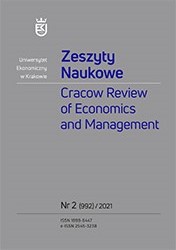Znaczenie i dynamika efektuacji w działaniach zespołów projektowych IT
DOI:
https://doi.org/10.15678/ZNUEK.2021.0992.0205Słowa kluczowe:
efektuacja, kauzalność, projekt, zespół projektowy, satysfakcja, efektywność zespołuAbstrakt
Cel: Celem artykułu jest sprawdzenie, na ile wdrażanie zasad efektuacji jest korzystne dla efektywności zespołów projektowych pracujących nad innowacyjnymi rozwiązaniami i czy wpływa na ich satysfakcję.
Metodyka badań: Badania ilościowe zrealizowano w studenckich zespołach projektowych z branży IT, opracowujących rozwiązania na zlecenie interesariuszy zewnętrznych. Do pomiaru zmiennych wykorzystano autorskie kwestionariusze. Przeanalizowano dynamikę modelu działań zespołów na dwóch etapach realizacji projektu.
Wyniki badań: Wyniki pokazały małą zmienność modeli podejmowania decyzji w procesie realizacji projektu. Potwierdzono znaczenie integrowania efektuacyjnych i kauzalnych założeń w różnych obszarach funkcjonowania zespołu.
Wnioski: Hybrydowy model podejmowania decyzji jest czynnikiem istotnym dla efektywności zespołu.
Wkład w rozwój dyscypliny: Analiza efektywności zespołów projektowych w kontekście zasad efektuacji jest zupełnie nowym podejściem w polskiej literaturze przedmiotu.
Pobrania
Bibliografia
Alzamora-Ruiz J., Mar Fuentes-Fuentes M. del, Martinez-Fiestas M. (2020), Effectuation or Causation to Promote Innovation in Technology-Based SMEs? The Effects of Strategic Decision-making Logics, „Technology Analysis and Strategic Management”, vol. 33, nr 7, https://doi.org/10.1080/09537325.2020.1849609. DOI: https://doi.org/10.1080/09537325.2020.1849609
Alzamora-Ruiz J., Mar Fuentes-Fuentes M. del, Martinez-Fiestas M. (2021), Together or Separately? Direct and Synergistic Effects of Effectuation and Causation on Innovation in Technology-based SMEs, „International Entrepreneurship and Management Journal”, https://doi.org/10.1007/s11365-021-00743-9. DOI: https://doi.org/10.1007/s11365-021-00743-9
Berends H., Jelinek M., Reymen I., Stultiëns R. (2013), Product Innovation Processes in Small Firms: Combining Entrepreneurial Effectuation and Managerial Causation, „Journal of Product Innovation Management”, vol. 31, nr 3, https://doi.org/10.1111/jpim.12117. DOI: https://doi.org/10.1111/jpim.12117
Brettel M., Mauer R., Engelen A., Küpper D. (2012), Corporate Effectuation: Entrepreneurial Action and Its Impact on R&D Project Performance, „Journal of Business Venturing”, vol. 27, nr 2, https://doi.org/10.1016/j.jbusvent.2011.01.001. DOI: https://doi.org/10.1016/j.jbusvent.2011.01.001
Evers N., Andersson S. (2021), Predictive and Effectual Decision-making in High-tech International New Ventures – A Matter of Sequential Ambidexterity, „International Business Review”, vol. 30, nr 1, https://doi.org/10.1016/j.ibusrev.2019.101655. DOI: https://doi.org/10.1016/j.ibusrev.2019.101655
Guo R. (2019), Effectuation, Opportunity Shaping and Innovation Strategy in High-Tech New Ventures, „Management Decision”, vol. 57, nr 1, https://doi.org/10.1108/MD-08-2017-0799. DOI: https://doi.org/10.1108/MD-08-2017-0799
Hauser A., Eggers F., Güldenberg S. (2020), Strategic Decision-Making in SMEs: Effectuation, Causation, and the Absence of Strategy, „Small Business Economics”, nr 54, https://doi.org/10.1007/s11187-019-00152-x. DOI: https://doi.org/10.1007/s11187-019-00152-x
Krawczyk-Bryłka B. (2020), Zasady efektuacji w realizacji projektów w rzeczywistości VUCA (w:) Zarządzanie kapitałem ludzkim 4.0 – wyzwania organizacyjne i kompetencyjne w perspektywie menedżerskiej, red. M. Stor, A. Domaradzka, Wydawnictwo Uniwersytetu Ekonomicznego we Wrocławiu, Wrocław.
Krawczyk-Bryłka B., Stankiewicz K., Tomczak M.T., Ziemiański P. (2018), Modele mentalne przedsiębiorczości: wskaźniki efektuacyjne vs. kauzalne, „Przedsiębiorczość i Zarządzanie”, t. 19, z. 10(2). DOI: https://doi.org/10.24917/20833296.152.4
Nguyen N.M., Killen C.P., Kock A., Gemünden H.G. (2018), The Use of Effectuation in Projects: The Influence of Business Case Control, Portfolio Monitoring Intensity and Project Innovativeness, „International Journal of Project Management”, vol. 36, nr 8, https://doi.org/10.1016/j.ijproman.2018.08.005. DOI: https://doi.org/10.1016/j.ijproman.2018.08.005
Ortega A.M., García M.T., Santos M.V. (2017), Effectuation-causation: What Happens in New Product Development?, „Managemenet Decision”, vol. 55, nr 8, https://doi.org/10.1108/md-03-2016-0160. DOI: https://doi.org/10.1108/MD-03-2016-0160
Read S., Song M., Smit W. (2009), A Meta-analytic Review of Effectuation and Venture Performance, „Journal of Business Venturing”, vol. 24, nr 6, https://doi.org/10.1016/j.jbusvent.2008.02.005. DOI: https://doi.org/10.1016/j.jbusvent.2008.02.005
Reymen I.M.M.J., Andries P., Berends H., Mauer R., Stephan U., Burg E. van (2015), Understanding Dynamics of Strategic Decision Making in Venture Creation: A Process Study of Effectuation and Causation, „Strategic Entrepreurship Journal”, vol. 9, nr 4, https://doi.org/10.1002/sej.1201. DOI: https://doi.org/10.1002/sej.1201
Sarasvathy S.D. (2001), Causation and Effectuation: Toward A Theoretical Shift from Economic Inevitability to Entrepreneurial Contingency, „The Academy of Management Review”, vol. 26, nr 2, https://doi.org/10.5465/AMR.2001.4378020. DOI: https://doi.org/10.2307/259121
Sarasvathy S.D., Dew N. (2005), New Market Creation through Transformation, „Journal of Evolutionary Economics”, vol. 15, nr 5, https://doi.org/10.1007/s00191-005-0264-x. DOI: https://doi.org/10.1007/s00191-005-0264-x
Sitoh M.K., Pan S.L., Yu Ch. (2014), Business Models and Tactics in New Product Creation: The Interplay of Effectuation and Causation Processes, „IEEE Transactions on Engineering Management”, vol. 61, nr 2, https://doi.org/10.1109/TEM.2013.2293731. DOI: https://doi.org/10.1109/TEM.2013.2293731
Pobrania
Pliki dodatkowe
Opublikowane
Numer
Dział
Licencja
Prawa autorskie (c) 2021 Zeszyty Naukowe Uniwersytetu Ekonomicznego w Krakowie / Cracow Review of Economics and Management

Utwór dostępny jest na licencji Creative Commons Uznanie autorstwa 4.0 Międzynarodowe.

